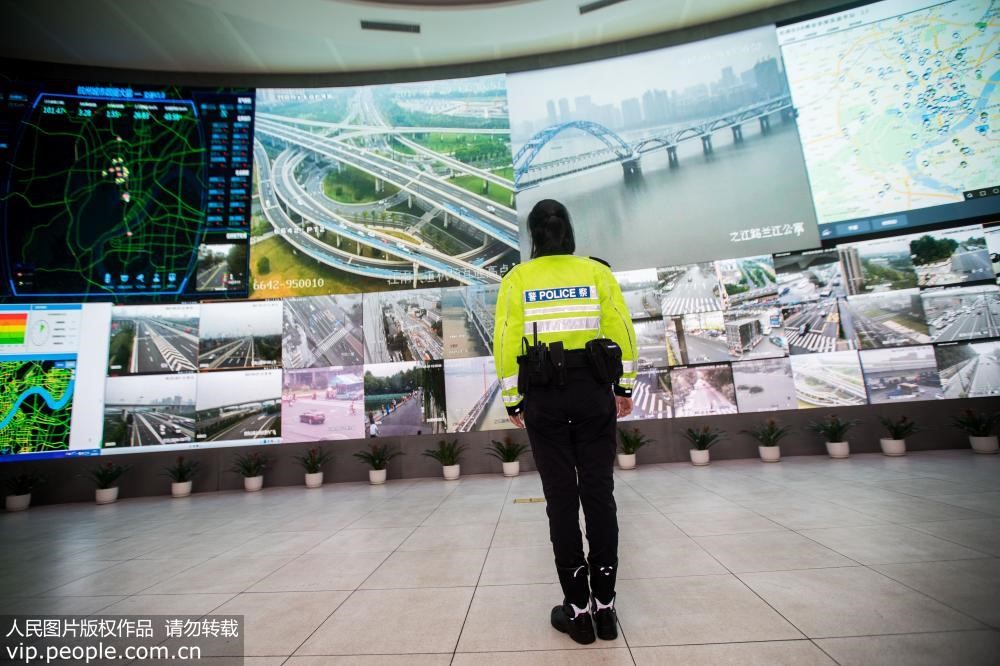

“You don’t have to worry about getting abducted. If I were to make a move, if you lose contact with friends and family, the police will find me in no time.”
Zhang Daqiang (pseudonym), a taxi driver from Hangzhou, east China’s Zhejiang province, joked to his passengers as his car sped along the elevated highways where camera after camera form a gigantic security net.
“Because the smart city brain is there. It is everywhere,” Zhang added.
Dubbed the smartest city in China, Hangzhou is the nation’s first to set up a “smart city brain” and is expected to further lead the nation in digitalization.

Zheng Yijiong, China’s first police officer to direct traffic with artificial intelligence, stands in front of the City Brain in Hangzhou, Zhejiang province. (Photo by People’s Daily Online)
A BIGGER goal
Zhejiang eyes to build a digital scientific innovation center with global impact and become a trade and finance center with emerging new models. The province will also lead the nation with demo districts on digital industry development, Gao Xingfu, vice provincial governor of Zhejiang, announced at the West Lake Cybersecurity Conference in Hangzhou on April 20.
The core output value of the digital economy’s added value in Zhejiang topped 554.8 billion yuan last year, up 13.1% year on year, which equaled to 9.9 percent of the provincial GDP. The digital economy’s core output and integrated output value combined took up 40% of the total GDP. By 2022, the total added value of the digital economy is expected to climb to over 50 percent, Gao introduced.
The smart city brain project was first launched in Hangzhou in 2016, which empowered the city with big data and AI to assist with city traffic and public security work.
“It is really helpful,” Zhang said. “There were many more traffic jams in the city before. Now, the smart city brain helps alleviate pressure on the roads with traffic flow diversion.”
Thanks to the AI hub set up by Alibaba that offers real-time analysis on traffic lights at 128 intersections and deployment advice for smooth traffic flows, waiting time has dropped by 15.3% in a pilot area that covers more than 9 million residents. On elevated highways, travel time is reduced by 4.6 minutes. It also boasts an accuracy of 92% on traffic accident reports, which greatly helps improve working efficiency for traffic police.
On public security, according to Dahua Technology, the company’s safe city project in one district of Hangzhou between 2015 and 2018 has yielded a series of fruitful results, including the increase of case closure rate of property crime, from 5.67% to 72.30%, which has improved police intelligence and practical applications.
Cyber security at the core
“While smart cities expand their influence across the nation, it is increasingly important to address cyber security risks that rise with smart city construction. In addition to smart city brains, we need smart and safe city brains with the help of AI, cloud computing, IoT, big data, and blockchain,” Fan Yuan, chairman of Hangzhou Anheng Information Technology Co. Ltd., told People’s Daily Overseas Social Media on the sideline of the conference.
Private enterprises for cyber security are at their best time for development in China as the nation is resolute in beefing up its cyber defense power, Fan commented, calling on all counterparts to be more creative and innovative in cyber security services.
Fan also announced at the conference that the company now boasts a special surveillance camera with an IoT security chip, which is reportedly able to not only safeguard the camera from hacking attacks, but also remains aware of the system’s security situation.
Dahua Technology, on the other hand, also actively takes technical and protection measures to guarantee data security, including forcing installers to initialize devices with new and complex passwords to reduce the risk of system breaches, an employee at the conference introduced to reporters.

 Award-winning photos show poverty reduction achievements in NE China's Jilin province
Award-winning photos show poverty reduction achievements in NE China's Jilin province People dance to greet advent of New Year in Ameiqituo Town, Guizhou
People dance to greet advent of New Year in Ameiqituo Town, Guizhou Fire brigade in Shanghai holds group wedding
Fire brigade in Shanghai holds group wedding Tourists enjoy ice sculptures in Datan Town, north China
Tourists enjoy ice sculptures in Datan Town, north China Sunset scenery of Dayan Pagoda in Xi'an
Sunset scenery of Dayan Pagoda in Xi'an Tourists have fun at scenic spot in Nanlong Town, NW China
Tourists have fun at scenic spot in Nanlong Town, NW China Harbin attracts tourists by making best use of ice in winter
Harbin attracts tourists by making best use of ice in winter In pics: FIS Alpine Ski Women's World Cup Slalom
In pics: FIS Alpine Ski Women's World Cup Slalom Black-necked cranes rest at reservoir in Lhunzhub County, Lhasa
Black-necked cranes rest at reservoir in Lhunzhub County, Lhasa China's FAST telescope will be available to foreign scientists in April
China's FAST telescope will be available to foreign scientists in April